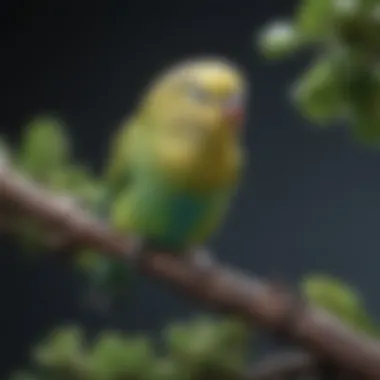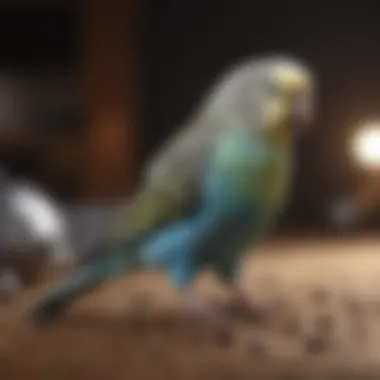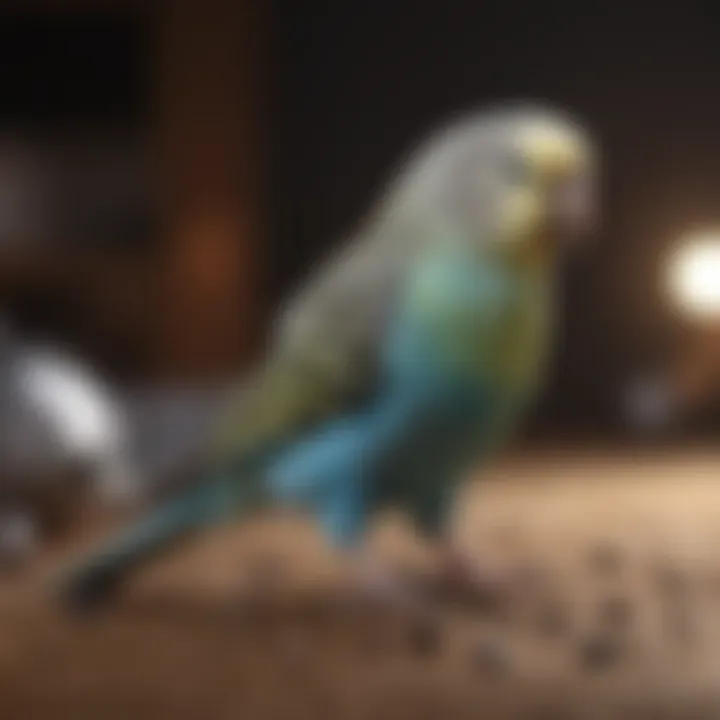The True Costs of Owning a Budgie: A Financial Guide


Intro
Owning a budgie can be an incredibly rewarding venture. While these little birds bring joy and companionship, they also come with a financial commitment that any prospective or current owner should fully grasp. It's not just about paying for the bird itself; various factors influence the overall costs involved in budgie ownership. This article will navigate through those expenses, making it easier for you to understand the financial path of nurturing a winged friend.
Care Tips
Taking care of your budgie goes beyond feeding and providing water. To ensure a thriving environment for your pet, a variety of daily routines and setups are necessary. Here’s a breakdown of aspects that often affect the financial aspects:
Daily Care Routines
Budgies require daily interaction and care. Activities like feeding, changing water, and social engagement generally consume about 30 minutes a day. You might find yourself investing in quality food and toys to keep your budgie stimulated. Comprehensive care can set you back around $20 to $50 monthly, depending on the quality of supplies.
Cage Setup and Maintenance
Your budgie's home will also need a proper setup. A spacious cage manufactured by brands like Vision or Prevue Hendryx, for instance, might range from $100 to $300. This expense covers the initial setup with perches, food bowls, and toys. Ongoing maintenance such as replacing worn-out toys, cleaning supplies, and ensuring the environment is safe can add an extra $15 to $30 each month.
Hygiene and Cleaning Practices
Cleanliness is non-negotiable when it comes to bird care. Regular cleaning is crucial for both hygiene and the bird’s health. Bird-safe cleaning products or simple solutions like vinegar can help, usually amounting to about $10 a month if you keep a routine of cleanliness in mind.
Seasonal Care Adjustments
Environmental conditions change with the seasons, and adaptation is necessary. During colder months, you might have to invest in additional heating lamps or cozies that can range from $20 to $60. On the flip side, summer might call for fans or air conditioning tweaks.
"Understanding the diverse aspects of budgie ownership equips current and aspiring owners for a smoother journey into avian companionship."
Behavioral Insights
Like all pets, budgies have their unique quirks and behavioral traits that can sometimes lead to challenges but can also bring immense joy.
Understanding Bird Body Language
Being attuned to your budgie's body language is key. They might puff up when happy but ruffle feathers when anxious. Familiarizing yourself with these cues can help resolve behavioral issues at no extra cost.
Common Behavioral Issues and Solutions
Some budgies experience jealousy or loneliness, necessitating potential solutions like additional toys or, in some cases, a companion bird. The potential cost for settling such issues could be anywhere from $30 to $200, depending on what you choose to address the behavior.
Positive Reinforcement Techniques
Rewarding your budgie through treats or praise encourages good behaviors and adds a sense of structure to your interactions. You might spend $10 to $40 monthly on various safe treats that promote positive reinforcement.
Social Interaction Needs
Budgies are social creatures and demand a good chunk of your time. Be prepared to invest in activities, toys, or even another bird. While having a buddy for your budgie could cost an additional $50 to $100, they can alleviate loneliness for both you and your feathered friend.
Nutrition Guides
Feeding is an essential component of budgie care, yet it comes with its own set of commitments and considerations.
Essential Diet Components
A balanced diet for a budgie is fundamental. Quality seed mixes typically run about $10 to $20 a month. Fresh vegetables and fruits should also be included, which can cost an extra $5 or more monthly.
Safe and Toxic Foods
Knowing which foods are safe and which are not is crucial. Foods like avocado or chocolate are poisonous to birds. Awareness of these can help prevent unwarranted vet visits, which could cost anywhere from $50 and up.
Supplements and Treats
Occasionally, you might want to add some supplements or treats for variety and nutrition. Brands like ZuPreem or Harrison's offer options ranging from $10 to $30 monthly.
Feeding Strategies for Different Species
Understanding the specific dietary needs of your budgie requires research. Using resources like the Budgerigar Society's website can help you tailor your feeding approach without additional costs but may take time.
Wellness and Health
Regular health evaluations and awareness of common symptoms can save you money and distress in the long run.
Routine Health Checkups
Routine checkups at the vet will cost you around $50 to $100 per visit, depending on your location and the vet's expertise. Such preventive care is a small price to ensure your budgie's long-term wellbeing.
Identifying Symptoms of Illness
Being able to spot early signs of illness will help in making informed decisions about health management. Knowledge is power and can lead to fewer emergency visits, which might set you back a decent chunk of cash.
Preventative Care and Vaccinations
Investing in preventative care may save you much larger sums down the road. Regular vaccinations, if recommended, usually cost about $30 to $50 annually.
Mental and Emotional Well-being
Budgies, like any pet, can experience anxiety or stress. Spending a bit on bonding activities can yield profit in terms of good health. This might mean toys or playtime; you can expect $20 to $50 annually.
Enriching Activities
Incorporating stimulating activities can significantly improve your budgie's quality of life.


Toys and Playtime Ideas
A variety of toys is essential for keeping your budgie engaged. Expect to spend approximately $10 to $30 monthly to keep their surroundings lively and challenging.
Training and Tricks
Training your budgie can foster a strong bond, but it requires time and patience. Special treat rewards will add to your monthly budget, suggesting an additional $10 to $20.
Outdoor Activities and Interaction
If conditions allow, outdoor flights under supervision can be beneficial for your budgie, costing practically nothing other than your time.
DIY Projects for Mental Stimulation
Last but not least, crafting toys or making furniture for your budgie yourself can save money while offering versatility. Basic supplies might cost around $10, and they can offer hours of mental challenge.
Now that you have a comprehensive view of the financial commitments associated with budgie ownership, you can balance the joys of companionship with the responsibilities that come with it. Understanding these facets not only prepares you financially but also positions you as a responsible pet owner.
Preface to Budgie Ownership
Understanding the financial dynamics of budgie ownership is essential for anyone contemplating this delightful hobby. Diving into the world of these little birds offers not only joy and companionship but also comes with a variety of expenses. This introduction sets the stage for a well-rounded discussion about what it truly takes to care for a budgie, underscoring important cost considerations and emotional commitments that accompany the choice of welcoming a budgie into your home.
One of the key benefits of owning a budgie is their relatively manageable size and amiable nature. However, ignoring the financial aspects can set potential owners up for a rough ride. From hatches to health check-ups, navigating these costs effectively can help ensure a fulfilling experience for both the budgie and their caretaker. Planning and anticipating all potential expenses is crucial in making an informed decision about whether or not to bring a budgie into your life.
Overview of Budgies as Pets
Budgies, known scientifically as Melopsittacus undulatus, are among the most popular pet birds worldwide. Their colorful plumage and engaging personalities make them an appealing choice for a wide range of bird lovers, from children to seasoned aviculturists. These birds, native to Australia, are often characterized by their social behavior and ability to mimic sounds, which adds an extra layer of charm to their companionship.
Typically, budgies are relatively easy to care for, which makes them suitable for first-time pet owners. Nonetheless, one should not underestimate the nuances of their care. Beyond feeding and social interaction, ensuring a budgie is healthy necessitates ongoing attention. A good understanding of their environmental needs—toys, a spacious cage, and fresh foods—can lead to a more enriched life for your feathery friend.
The Appeal of Budgies
What makes budgies so irresistible? For many, it boils down to their sociable and affectionate nature. Unlike some other species of birds, budgies thrive on interaction and can form strong bonds with their owners. This can lead to delightful experiences, like budgies whistling tunes, following you around the house, or even learning to talk with a bit of patience.
Moreover, considering their affordability in contrast to larger birds, budgies often present themselves as an inviting avenue into bird ownership. However, it is important to remember: while the initial costs might seem low, the ongoing expenses require thoughtful budgeting. Hence, carefully weighing both emotional and financial readiness is vital.
"Caring for a budgie is a journey filled with chirps and bonds, yet requires one to be financially prepared."
Before jumping into budgie ownership, it’s essential to feel prepared—financially and emotionally. The joys they bring can be rewarding, but understanding the commitment is what makes a responsible pet owner.
Initial Cost Considerations
When it comes to owning a budgie, grasping the initial cost considerations is vital. These are the first financial steps you take on your journey with these charming pets, setting the stage for the commitment that lies ahead. Understanding these costs not only prepares your wallet but also shapes how you’ll care for your new friend. By being well-informed, you’ll be able to budget wisely and provide an optimal environment that nurtures health and happiness.
Purchasing a Budgie
Reputable Breeders
Purchasing a budgie from a reputable breeder carries weighty implications for both the bird's well-being and your journey as a pet owner. Reputable breeders often offer healthy birds, ensuring good genetic backgrounds and correct socialization. This assures you of a lively budgie full of vibrancy, which is key for bonding and interaction.
One standout characteristic of good breeders is their commitment to breed standards. They often focus on specific color and temperament traits, resulting in healthy birds that properly fit into family dynamics. Moreover, purchasing from a breeder tends to guarantee some vet-check history, which can save you from future medical surprises.
However, it’s important to note that breeders may charge a premium. This initial outlay could be higher than other options, reflecting the care they provide. So, while buyers pay more up front, they often dodge later medical issues, making it a wise long-term investment.
Local Pet Stores
On the other hand, local pet stores can be a more accessible option when selecting a budgie. These outlets usually have a variety of species, and they can be quite convenient for first-time buyers. A key characteristic of local pet stores is that they can sometimes offer lower prices—especially on younger birds or seasonal promotions.
Local stores frequently present more immediate availability—no waiting lists or inquiries. You can simply walk in, observe the birds, and choose a budgie that resonates with you. However, there are trade-offs. These shops might not have deep knowledge about their flock's health history, potentially leaving unwary buyers vulnerable to health concerns that could arise post-purchase. It’s wise to ask questions or look for any applied health guarantees before making a decision.
Adoption from Rescues
Adoption from rescues is a noble choice that deserves special mention. Every budgie deserves a second chance, and adopting one from a rescue not only fills your home with joy but also provides a bird a renewed opportunity at life. One of the most significant aspects of this route is the financial factor; typically, adoption fees are significantly lower than purchasing from a breeder or pet store.
Another appealing feature is that most rescues have vetted their birds for any health issues; they often come with a history that provides invaluable insights into the bird’s personality and needs. This transparency can ease the transition into your home, forming a strong bond based on familiarity.
However, a potential downside could be the limited selection when it comes to colors or mutations. Rescues focus on the well-being of every bird they care for, which sometimes means they may prioritize helping birds with less market demand, potentially limiting your choices. Yet, should you be open to variety, adopting from rescues brings moral satisfaction that far exceeds financial implications.
Price Variability
When we start counting the costs associated with budgie ownership, it becomes clear that price variability plays a significant role. Not just the initial purchase price, but also the overall budget can change drastically depending on various factors.
Color and Mutation Factors
One of the biggest determinants in budgie prices is the color and mutation factors. Budgies come in a spectrum of colors and patterns, ranging from the common greens and yellows to more exotic hues like albino or lutino. These unique characteristics can drive prices up significantly, as they are often in higher demand.
The key takeaway here is that color variations not only satisfy aesthetic preferences but also reflect the breeder’s specific attention to breeding practices. For instance, if you have your eyes set on a rare mutation, be prepared to fork out a good amount as they are often rarer and can fetch higher prices. This is a double-edged sword, though, as varied pricing can impact your budget considerably.
Geographic Location
The geographic location also plays a crucial role in determining costs. Prices in urban settings, where demand is typically higher, often contrast sharply from those in rural areas. Pet stores and breeders located in densely populated cities may mark up prices due to the competition and demand. Conversely, in smaller towns, it could be easier to find more reasonable prices.
Another notable feature is market trends of a specific area, which could change frequently based on local economies. Hence, before embarking on your budgie quest, it's wise to research and compare costs within your vicinity. By understanding regional pricing dynamics, you can make a more informed decision about how to fit a budgie into your budget.
Essential Setup Costs
When considering budgie ownership, understanding essential setup costs is paramount. This isn't merely about how much you can throw down initially; it boils down to crafting a suitable environment for your feathered companion. An adequate living space and proper nutrition can significantly impact your budgie's health and happiness, saving you future expenses related to medical issues or behavioral problems.
In this section, we will break down the various segments of setup costs to give you a clearer picture of what lies ahead.
Aviary Requirements


Cage Size and Type
A substantial aspect to consider when setting up for a budgie is the cage size and type. Budgies are energetic little critters that require space to flit about. A cage that resembles a shoebox will not cut it! Instead, a spacious cage allows them to spread their wings and engage in natural behaviors. For instance, a flight cage, larger than a standard cage, promotes exercise and mental stimulation.
The key characteristic of a flight cage is its long, horizontal space. This design enables budgies to fly short distances, which is an essential part of their well-being. Choosing a horizontal cage over a tall one might seem trivial, but it can make all the difference for your budgie.
Advantages include the promotion of physical activity and a reduction in stress, making a flight cage a popular choice. However, keep in mind that these cages usually come at a steeper price. Investing in the right cage from the start often pays off in the long run, leading to fewer health issues related to sedentary lifestyles.
Cage Accessories
Next on the list are cage accessories. This includes perches, food and water dishes, and toys that can turn an empty cage into a lively space. These items not only contribute to your budgie’s comfort but also stimulate their curiosity. Natural wood perches tend to be a popular choice as they are easier on the feet and more comfortable than plastic.
Incorporating various toys and enrichment items helps alleviate boredom, which is crucial. A bored budgie can develop harmful behaviors like feather plucking. The real unique feature of accessories lies in their ability to enhance your budgie’s quality of life. However, remember that high-quality accessories are often priced higher, but you don’t want to skimp on your bird’s happiness.
Feeding and Nutrition
Moving on, let's discuss the feeding and nutrition costs you’ll incur. Proper nutrition is fundamental to your budgie’s health, influencing everything from energy levels to feather quality.
Quality Seed Mixes
When it comes to quality seed mixes, don’t settle for the cheapest options in the pet store. A good seed mix should provide the necessary vitamins and minerals for your budgie. High-quality seed mixes are specifically formulated to cater to the diverse nutritional needs of these birds, so it's worth doing some research before selecting one.
A key characteristic of these mixes includes the variety of seeds and added nutrients that promote overall health. Unfortunately, some budget brands lack these essentials, leading to various health complications down the road. Thus, while they may cost more upfront, investing in quality seed mixes often means preventing costly vet visits later.
Supplemental Foods
Beyond seed, supplemental foods like fresh fruits and vegetables can dramatically improve your budgie’s diet. This aspect shouldn’t be overlooked, as a diverse diet can fend off health problems and keep your budgie content.
These foods provide the necessary hydration and extra nutrients that your budgie might not receive solely from seeds. Carrots, broccoli, and various berries are well-accepted by many birds. The advantage of these supplements is significant, though they come with a recurring expense that should be factored into your ongoing budget.
Health and Grooming Supplies
Finally, let’s touch on health and grooming supplies. These costs can seem daunting, but they’re indispensable for ensuring your budgie remains healthy.
Vet Visit Costs
While some might think they can forgo vet visits, this isn’t a wise choice. Regular veterinarian check-ups serve to prevent any potential health issues. The key characteristic of vet visits is that they offer early detection of diseases, saving you from unexpected, hefty bills later. Depending on your location and chosen vet, costs can vary, but budgeting for at least one annual visit is a sound practice.
Grooming Tools
Lastly, grooming tools like nail clippers and feather dusters are often necessary to maintain your budgie’s hygiene. These tools ensure your bird's feathers remain healthy and their nails do not overgrow. Having the right tools is crucial, and while they might require a bit of an investment, they facilitate easier care routines without the need for professional grooming every time.
In summary, establishing quality essentials for your budgie not only makes financial sense but also contributes to a long, healthy life for your pet. Without these preparations, you may end up facing unforeseen challenges that can lead to both emotional and financial strain.
Ongoing Care Expenses
Understanding the ongoing care expenses associated with budgie ownership is essential for anyone considering adding one of these feathery friends to their life. These expenses are not just about the immediate needs of your pet; they reflect a commitment to providing a loving and healthy environment for your budgie. Regular allocation of funds toward these necessities can significantly influence your budgie's health and happiness, ultimately ensuring that your companion thrives.
Monthly Food Costs
Seed Mix Costs
One of the primary monthly expenses you'll encounter is the seed mix costs. Budgies have specific dietary needs that must be met to ensure they remain active and healthy. Quality seed mixes are usually more beneficial than cheaper alternatives, providing essential nutrients that promote vibrant plumage and strong bones. It's crucial to choose a seed mix that doesn't just contain fillers but instead focuses on a mix of high-quality grains and seeds like millet, canary seeds, and oats.
The key characteristic of seed mixes is their balance of fats, proteins, and carbohydrates, all of which are vital for a budgie's diet. Opting for a reputable brand over generic ones may lead to better health outcomes, which can ultimately save you money on vet bills down the line. However, some mixes can sometimes be relatively costly depending on the brand and quality, which may be a disadvantage for budget-conscious owners.
Fresh Food Budget
In addition to seed mixes, a fresh food budget is a critical aspect of your monthly expenses. Fresh fruits and vegetables are imperative for ensuring your budgie receives necessary vitamins and minerals. Foods like spinach, carrots, and apples bring variety and excitement to their diets while also keeping them healthy. The key characteristic of including fresh food is its contribution to a more enriched diet and enhanced well-being.
While it's definitely a beneficial choice, it can also require a bit of time and effort to prepare. Owners must keep in mind that fresh food can be quite perishable; therefore, managing your budget around this can be tricky at times, as you'll need to account for waste. Here’s where planning ahead can really pay off. Overall, a monthly fresh food budget reflects a holistic approach to your budgie's health and can help mitigate costly medical issues down the road.
Health Maintenance
Regular Vet Check-ups
The necessity for regular vet check-ups cannot be overstated when it comes to ensuring long-term health for your budgie. These check-ups typically cover essential vaccinations and early diagnosis of any underlying issues. Regular veterinary visits also allow owners to ask questions on proper care and diet.
The beneficial character of these check-ups is in their preventive nature, often identifying any problems before they become serious. Investing in a good vet familiar with avian health can pay dividends in peace of mind. Sure, there may be a cost involved that can sometimes deter new budgie owners, especially if they didn't factor it into their budgeting plans initially. But in terms of longevity of your pet, this often comes out cheaper than waiting until something’s visibly wrong, which could lead to emergency appointments that are far more expensive.
Unexpected Medical Expenses
Having a budget for unexpected medical expenses is an often overlooked facet of budgie ownership. Just like humans, birds can fall ill quite suddenly, and being financially unprepared for these occurrences can be stressful. Many pet owners discover that emergencies arise at the most inconvenient times. Indeed, this is why it's vital to earmark some funds specifically for unforeseen health issues.
The key characteristic of recognizing the potential for these expenses is the awareness it brings. Assuming everything will go smoothly can leave owners in a tight spot if an unplanned vet visit is required. Even minor issues can lead to significant vet bills, making it essential to have a financial buffer in place.
Supplies and Accessories Replacement
Cage Liners
Regarding cage liners, while often seen as a minor detail, they play a pivotal role in budgie care. A clean cage is vital not only for hygiene but also for the mental well-being of your budgie. The liners should be changed regularly to prevent build-up of waste and bacteria.
Key characteristics of these liners include absorbability and ease of cleaning. There's a range of materials available – from paper-based products to washable options – each providing unique benefits. However, it’s worth noting that high-quality liners can sometimes be pricier. Fortunately, investing in good liners reduces the risk of health problems related to cage cleanliness, which can save some dollars in the long run.
Toys and Enrichment
Lastly, you cannot overlook the costs of toys and enrichment materials. Budgies are intelligent creatures that thrive on stimulation. They require a variety of toys—chew toys, foraging toys, and swings—to keep them entertained and healthy. Investing in quality toys can prevent boredom, which can lead to behavioral issues.
The unique feature of these enrichment items is their ability to promote physical and mental exercise necessary for a budgie's well-being. However, it's important to be wary of potential downsides, such as wear and tear, meaning that you’ll have to replace them regularly. Keeping a lookout for affordable yet engaging toys can help manage this ongoing expense effectively.


In summary, the expenses related to ongoing care of your budgie go beyond just feeding; they encompass everything from health to enrichment. Keeping a keen eye on all these costs can greatly enhance the experience of budgie ownership, ensuring that both you and your feathered friend enjoy every moment together.
Budgeting for a Budgie
Budgeting for a budgie is not just a checklist item; it’s a cornerstone of responsible pet ownership. If you want to keep both your feathered friend happy and your finances in check, understanding the costs involved is crucial. This section will delve into the creation of a financial plan while also addressing the necessity of emergency funds for health issues that may arise later.
Starting off with a proper budget can prevent surprises down the line. Foremost, having clarity on the expected costs can lead to not only better decision-making but also a deeper commitment to the care of your budgie. Think of it like laying the foundation of a house; without a solid base (your budget), the house (your relationship with your budgie) can become unstable.
Creating a Financial Plan
Initial Investment Breakdown
When first budgeting for your budgie, the initial investment is something that can't be overlooked. This covers everything from the price of the bird itself to the cage, food, and setup of its living space. On average, purchasing a budgie from a good breeder can range anywhere from fifty to a hundred dollars, but that’s only scratching the surface.
A well-constructed initial investment breakdown should look something like this:
- Purchase price of the budgie
- Cage: Size and type can greatly influence costs, with adequate cages running between one hundred and three hundred dollars.
- Accessories like perches, toys, and bowls add another layer of expense.
- Initial food stocks and supplements contribute as well.
- Other essentials like grit and cuttlebone.
What makes the initial investment a savvy choice? It gives you foresight into what you need and ensures your budgie can settle into a comfortable environment right from the start. The downside, however, is the upfront burden it places on your finances. Still, investing wisely at the start can save you from costly mistakes later.
Ongoing Monthly Budget
After you've figured out the initial costs, you can’t forget about the ongoing monthly budget. This includes food, replacement of toys, and potential vet visits. While the upfront costs can be steep, the ongoing expenses generally run a bit lower, but they still need to be accounted for.
An efficient ongoing budget might consist of:
- Monthly seed mix costs averaging around twenty to forty dollars.
- Fresh fruits and veggies, which could add up to fifteen or twenty dollars.
- Regular toys and other accessories, about ten dollars each month.
What distinguishes the ongoing budget? It's predictable, allowing for adjustments. You know what to expect month to month, making it easier to manage. The potential pitfall, however, is overlooking occasional larger expenses that can arise, like sudden vet visits, which can disrupt even the best-laid plans.
Emergency Funds for Health Issues
No matter how careful you are, health issues can crop up. Setting aside an emergency fund specifically for your budgie can safeguard against sudden financial strains. A good rule of thumb is to aim for at least two hundred to five hundred dollars. This will cover unexpected vet visits or treatments without wreaking havoc on your regular budget.
Having a healthcare safety net means you won’t have to make tough decisions between your budgie's well-being and your finances. In times of need, this fund could be the difference between adequate care and subpar treatment, allowing you to handle emergencies with grace.
To sum it up, budgeting for a budgie is not merely about numbers and spreadsheets. It's about ensuring a stable, loving, and healthy environment for your pet. Stay organized and proactive, and your feathered friend will thank you with chirps of joy!
Hidden Costs of Budgie Ownership
Owning a budgie can be a joy, but it's important to look beneath the surface. When people think of the cost associated with pet birds, they often focus on buying the bird and the setup. However, hidden costs can quietly creep up and affect your budget. Understanding these costs will help prospective owners to be better prepared, ensuring they don’t find themselves in financial trouble down the road. It’s not just about the monetary aspect; these hidden costs often translate into greater responsibility and planning.
Potential Travel Costs
Care During Vacations
Vacations, while enjoyable, can create a bit of a quandary for budgie owners. Arranging care for your feathered friend during your absence is crucial. You have options; you could ask a friend to look after your budgie, hire a pet sitter, or explore boarding facilities that specialize in birds. Each choice has its own merits. A sitter comes with familiarity and direct care, while a facility may provide specialized attention from professionals.
The key characteristic of care during vacations is its necessary planning. Making arrangements requires foresight, which can help mitigate the stress for both you and your budgie. Not planning ahead may lead to scrambling at the last moment, which can be less than ideal for your pet’s welfare.
One of the unique features of boarding is that it can sometimes provide extra care that a pet owner might not have time for, such as regular checks and monitoring of any health issues. However, this option does come with its costs, which may stack onto your regular expenses.
Transportation Expenses
Traveling with your budgie presents additional financial considerations. If you plan to include your bird on your travels, you'll need to purchase an appropriate travel cage. Furthermore, some accommodations may charge extra if you arrive with pets. This can add unforeseen costs before you even factor in your travel arrangements.
The key characteristic here involves adapting your travel plans to include your budgie, which can reduce stress for both you and your pet. Many budgies are social creatures and may enjoy the change of scenery; however, frequent travel can lead to increased fatigue and stress for the bird.
The unique feature of transportation expenses is they can vary significantly based on your travel destination and the means of transport you choose. For instance, flying might have stricter regulations and higher costs compared to a road trip. While some might find these expenses quite manageable, others could be taken aback by the total when combining costs.
Home Repairs and Modifications
Budgie-proofing Your Home
Budgie-proofing your space is often overlooked but is essential in any budgie ownership journey. This entails removing or securing anything in your home that could harm your curious companion. Things like toxic plants, exposed electrical wires, and easily breakable items need attention. Extra financial resources might be needed for proper cage covers and protective netting for windows.
The key characteristic of budgie-proofing is to promote a safe environment. This approach does not only means securing the living area but can also enrich the birds' experience, allowing them to explore while minimizing danger.
The unique feature of budgie-proofing involves a proactive approach that can potentially save money in the long run. Avoiding damage to your home can keep your repair costs low. Ignoring these needs can lead to unforeseen expenses if a budgie decides to take a nibble out of that expensive couch.
Potential Damage Costs
Lastly, potential damage costs are inherent in owning any pet, especially birds. Budgies are known for their playful nature, which can sometimes lead to destructive behavior. If left unattended, they might chew on furniture, carpet, or walls, leading to unexpected repair costs.
The key characteristic here is understanding that owning a budgie includes a mutual commitment to respecting both your space and theirs. Creating designated safe zones can help lean into this aspect positively.
In addition, the unique feature of potential damage costs serves as a reminder that every pet should have their space. If they feel neglected, their actions can reflect their discomfort and lead to damage that you'll end up paying for.
In summary, it’s wise to consider the hidden costs of budgie ownership. Care during vacations, transport expenses, home modifications, and potential damage can all significantly influence the overall budgeting for owning these delightful creatures. Thoughtful planning and awareness are key to enjoying the pleasure that budgies can bring without breaking the bank.
Ending
When it comes to owning a budgie, the financial aspect is not just an afterthought; it’s a cornerstone of responsible pet ownership. Understanding the intricacies of the costs involved helps prospective budgie parents prepare themselves for what lies ahead. From initial purchases to daily care, every decision points back to your wallet, and a well-planned budget can save you from strife later. The concise financial layout discussed in this article reveals not just the numbers but also the emotional commitment connected to those expenses.
Summary of Financial Commitments
In summary, becoming a budgie owner means carving out a niche in your budget for a variety of expenses. Here’s a brief rundown to keep in mind:
- Initial costs: Consider your investment in the bird itself, the cage, and essential supplies needed right from the get-go.
- Ongoing care: Monthly food supplies, regular vet check-ups, and health maintenance can add up.
- Emergency funds: Setting aside money for unexpected vet visits can cushion the blow of sudden costs.
- Hidden expenses: Think about vacations and home modifications to budgie-proof your space.
Knowing these financial commitments will allow potential budgie owners to make informed decisions, ensuring that they are not only providing a home for a pet but also delivering a high-quality life for their feathered friend.
Final Considerations Before Getting a Budgie
Before diving headfirst into budgie ownership, a few final thoughts should be considered. First off, think about the long-term commitment that comes with having a budgie. They may be small, but their needs — both financial and emotional — are quite significant. The allure of adopting a budgie might be immense, but it’s essential to glance over the long road ahead.
- Lifestyle compatibility: Consider your daily routine and whether you can accommodate the time and care that a budgie will require.
- Potential relocation: Having a plan for your budgie’s care during travels helps mitigate unforeseen expenses.
- Emotional readiness: Are you prepared for the responsibilities of caring for a living being? It’s not just finances; mental and emotional preparedness is key too.















